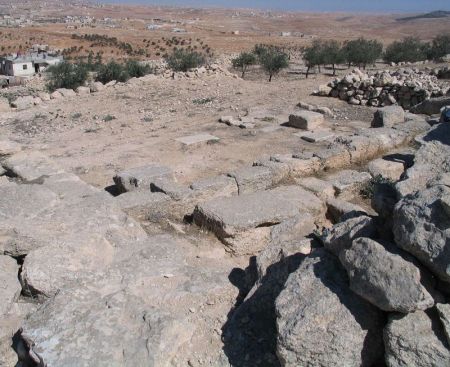What was the capital of Israel in the Old Testament?

While Jerusalem is most often talked about as the "eternal" capital of Israel, a claim at the center of bitterly contested modern geopolitics, the history is much more complicated.
"Everywhere you put a shovel in the ground in Jerusalem, you will find Jewish roots and connecting to Bible stories," Jerusalem mayor Nir Barkat told NPR in a December 2017 interview.
For Jews the importance of Jerusalem dates back to around 1050 B.C. when King David conquered the city and his son, Solomon, would build upon what he started, raising the Temple on the Mount, a project that Roman client King Herod would finish many years later. That temple was destroyed in 70 A.D. and what's left of the ruins is the Western Wall, also known as the Wailing Wall, and is the holiest site in Judaism.
Today, the Temple Mount and surrounding area is arguably the most disputed piece of real estate on Earth. Presently, the Dome of the Rock, an Islamic shrine, sits atop the Mount.
Yet according to biblical history, Shechem was the first capital in the Kingdom of Israel, followed by Tirzah.
Several key events in the Great Story of Scripture occurred in Shechem.
Shechem, which means "shoulder" in Hebrew, first appears in Genesis 12 where it is recounted that Abram, before he became Abraham, arrived at the "oak of Moreh" at Shechem and built an altar; it was here where God promised him and his descendants the land of Canaan.
Following the settlement of the Israelites in Canaan after they were liberated from enslavement in Egypt, Shechem was also where Joshua gathered the Israelites and asked them to choose between serving the God who had delivered them from Egyptian bondage, or the pagan deities their ancestors had worshiped.
The Israelites chose to serve the God of the Bible, a choice Joshua recorded in the Book of the Law of God, and he then erected a memorial stone "under the oak that was by the sanctuary of the Lord," as is described in Joshua 21.
After King Solomon's death, "all Israel" came to Shechem for the installation of Solomon's son Rehoboam. But when Rehoboam refused to ease the burden of forced labor his father had imposed on the northern tribes, the meeting ended as the ten northern tribes seceded. Shechem was ultimately established as the capital under the new breakaway Kingdom of Israel.
"Although Jeroboam had been appointed to be king of Israel by the prophet Ahijah, the biblical writers indicate that he lost his blessing when he decided not to encourage pilgrimages to Jerusalem's temple, but instead established rival centers of worship at Bethel and Dan," the New World Encyclopedia notes.
The kings of Israel soon moved the capital farther north to Tirzah.
Shechem would eventually become an important Samaritan city and is the location of Jacob's Well, which, as is described in the Gospel of John, Jesus famously met and interacted with a Samaritan woman, something that was forbidden in that culture.





















